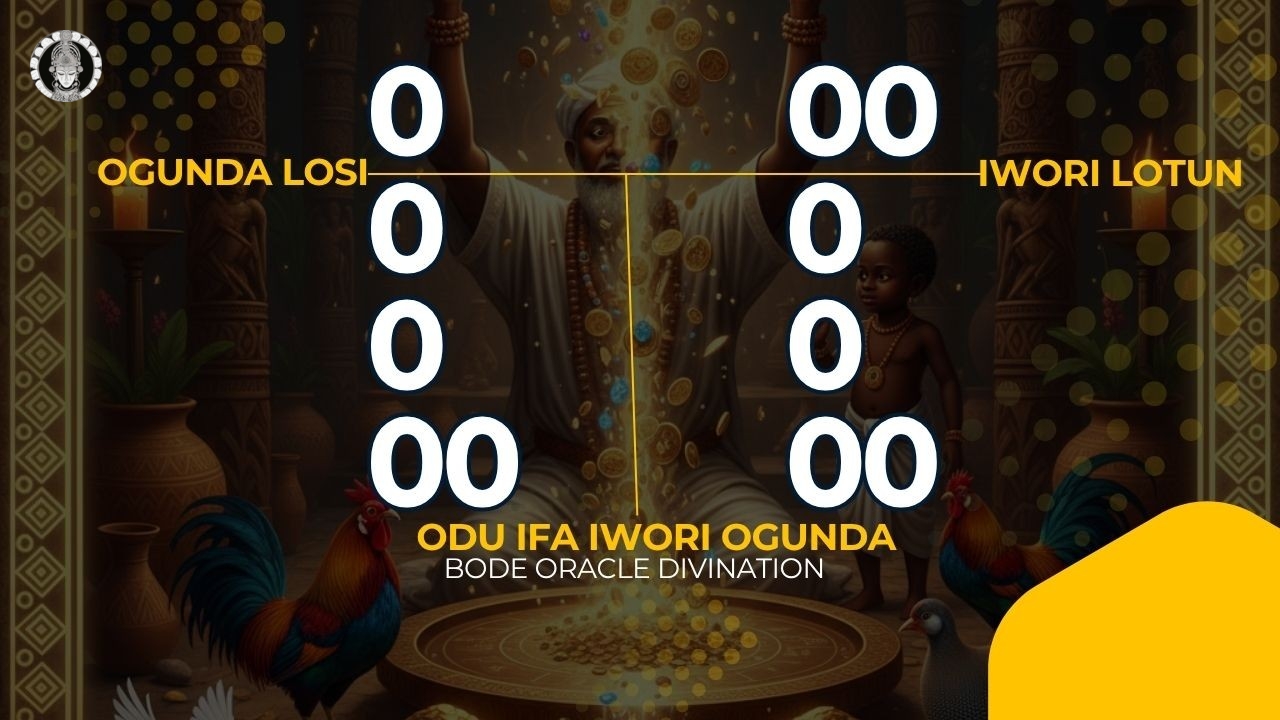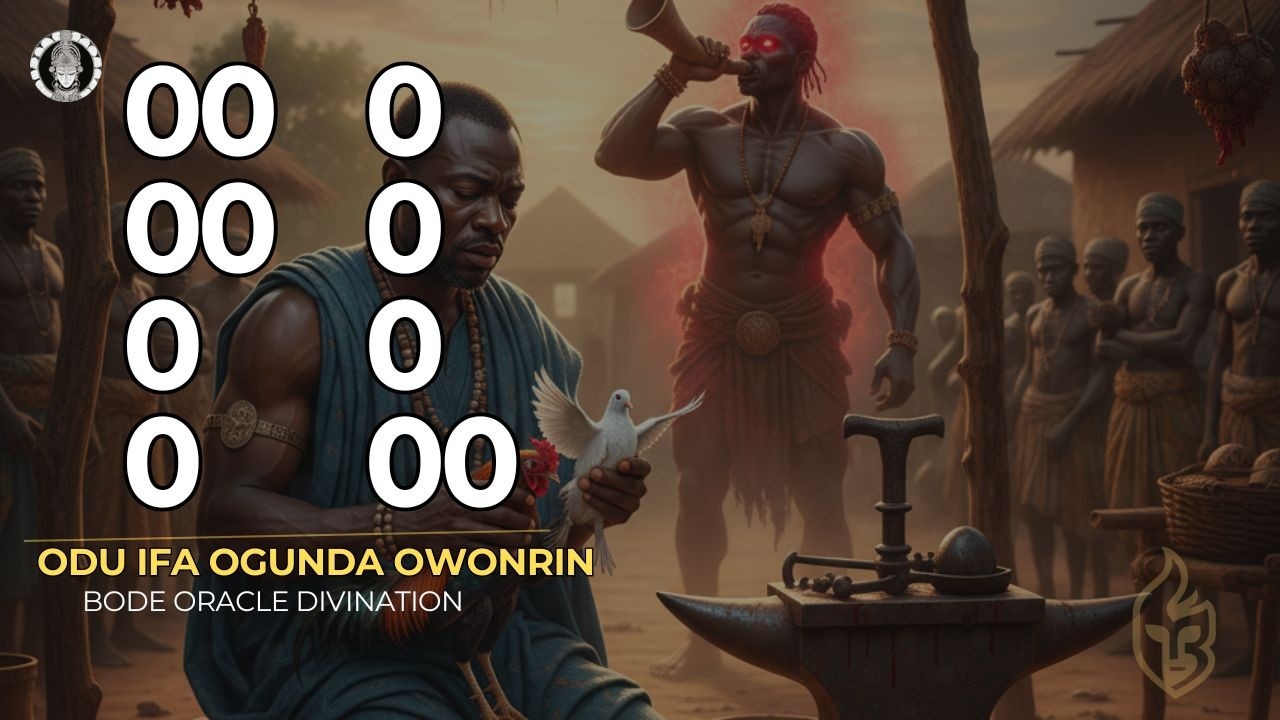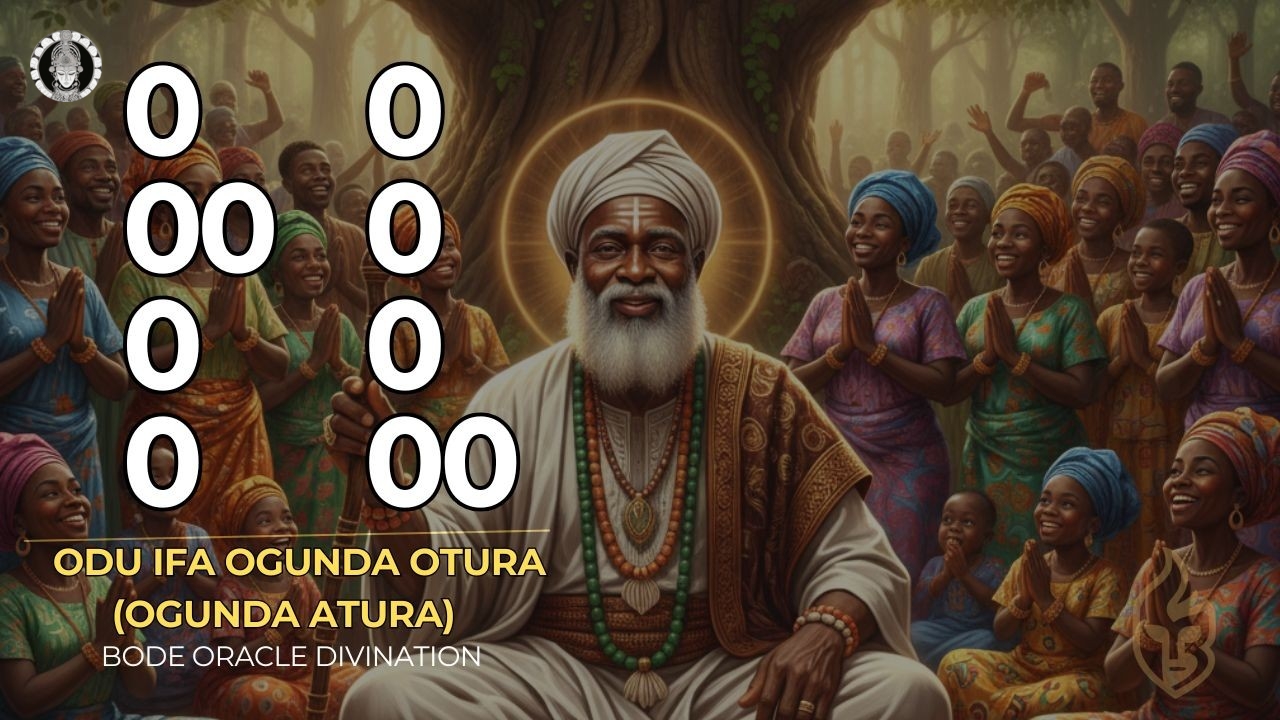Introduction to Odu Ifa Ogunda Otura (Ogunda Atura)
Odu Ifa Ogunda Otura, also known as Ogunda Atura, represents one of the 256 sacred divination signs in the Ifa corpus. This powerful Odu carries profound messages about achieving leadership and recognition in competitive situations, receiving extraordinary blessings of childbirth and fertility, transforming humble circumstances into prosperity, and securing protection from enemies who seek to cause harm. Through the wisdom of Ogunda Otura, we learn how proper sacrifices combined with obedience to spiritual guidance can position us for divine favor that supersedes human limitations.
The divinations within Ogunda Otura address fundamental human aspirations and challenges: the desire to be chosen for positions of authority, the longing for children and family expansion, the struggle to overcome disadvantageous circumstances, and the need for protection when surrounded by adversaries. Each story serves as both practical guidance and spiritual instruction, teaching us that knowledge without action produces no results, but faith demonstrated through sacrifice opens doors that remain closed to others. For comprehensive understanding of the complete Odu Ifa system, explore our detailed directory.
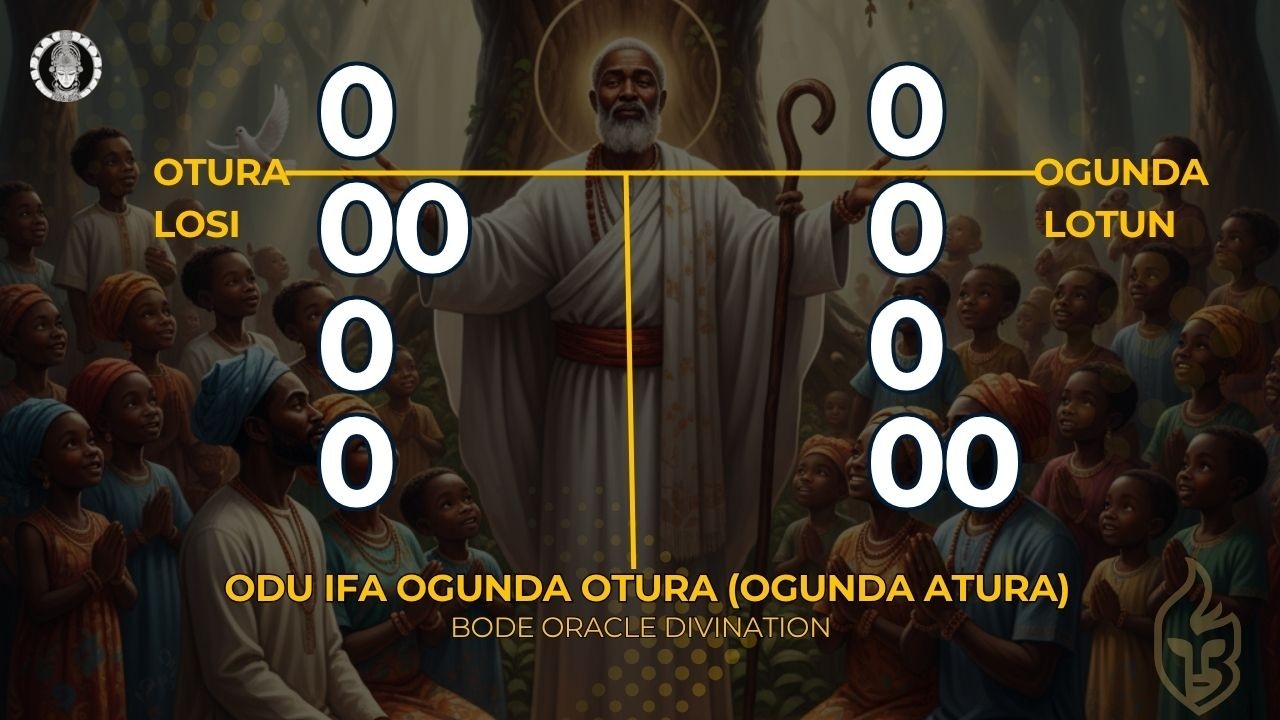
Ifa Divination for The Farm Tree: Divine Selection for Leadership
Understanding the Message of Competitive Selection
This divination from Ogunda Otura addresses one of the most common situations in human society—competition for positions of leadership, authority, or recognition. Ifa reveals that the person receiving this Odu is competing with others for something significant, and the question at hand is: who will be chosen? The Farm Tree divination demonstrates that when proper spiritual preparation is made, divine selection supersedes human judgment and competition.
The story speaks to those who find themselves in situations where many are qualified but only one will be chosen—for jobs, titles, contracts, honors, or any form of recognition. Ifa makes it clear that while human effort and qualifications matter, spiritual obedience is what positions a person for divine favor that ensures their selection.
The Symbolism of Trees and Leadership
The choice of a farm tree as the protagonist carries deep meaning in Yoruba agricultural society. Among all the trees in the farm, one must be designated as the leader—the central tree around which others are organized, the one that provides shade and structure to the farm. This mirrors human social organization where, among many qualified individuals, one must be chosen to lead. The farm tree's selection demonstrates that leadership is not about being the tallest, oldest, or most impressive in appearance, but about being spiritually prepared for the responsibility.
The Sacred Verse
Arogbagede gba
Adifafun enlojo igi oko
Won n sunkun pawon o lolori
Adifafun afomo ti won o mun joba igi loko
Ebo ni won ni o se
O si gbebonibe orubo
Nje, amun afomo joloja gbogbo igioko
Emo mo wa ewa sin
gbogbo igi oko
English Translation
Arogbagede gba
Ifa divination was cast for the farm tree,
Who was crying that they had no leader.
Ifa divination was cast for Afomo, who would become king of all trees in the farm.
He was asked to offer a sacrifice,
And he complied.
Therefore, we have made Afomo the leader of all trees in the farm.
Come, let us serve and honor
All the trees of the farm.
The Power of Spiritual Preparation in Competition
What makes this divination particularly instructive is its revelation that when many are competing, the one who performs proper sacrifice positions themselves for divine selection. This does not diminish the importance of qualifications, character, or capability—rather, it adds the dimension of spiritual favor that often makes the difference when multiple qualified candidates exist. The crying of the trees ("won n sunkun pawon o lolori") represents the anxiety and uncertainty that precedes selection, a state familiar to anyone who has competed for something important.
Prescribed Offerings (Ebo)
For those seeking leadership positions or competing with others, Ifa prescribes a rooster (akuko adie), which represents authority and the announcement of one's position; a hen (agbebo adie), symbolizing nurturing leadership that cares for those under one's authority; pigeons (eyele), representing peace and the peaceful transition into leadership; and money (opolopo owo), which facilitates the practical aspects of assuming leadership and maintaining the ceremonies associated with authority.
Practical Application for Modern Times
In contemporary society, this Odu speaks to anyone competing for positions—job interviews, promotions, elected offices, academic positions, business contracts, or any situation where selection must be made among multiple candidates. The principle remains constant: combine your qualifications and efforts with proper spiritual preparation. For deeper understanding of Ifa's role in Yoruba cultural and spiritual systems, consult UNESCO's documentation.
Ifa Divination for Orunmila: The Extraordinary Blessing of Fertility
The Universal Longing for Children
This divination from Ogunda Otura addresses one of the most fundamental human desires—the blessing of children. Ifa reveals a situation where various creatures approach Orunmila with the same concern about childbirth. The rat, fish, bird, goat, and human all express their struggles with fertility and their longing for offspring. Orunmila's response demonstrates that the solution lies not in the severity of the problem but in the willingness to perform prescribed sacrifices.
The divination specifically promises not just ordinary childbirth but extraordinary fertility—the ability to give birth in a single day, to have twins (yaayaa), and even triplets (yanya). These represent not just numerical abundance but the fullness of blessing that comes when spiritual obligations are met with faith and obedience.
The Sacred Verse
Orunmila wi odi si la sila
Ifa mo ni odi silo silo
Orunmila ni ki n lese sila sila si
Ki lese silo silo si
Omo eku ni tori omo ni
Omo eja ni tori omo ni
Omo eye ni tori omo ni
Omo eran ni tori omo ni
Omo eniyan naa nitori omo ni
Orunmila ni won o maa bi yaya
Won o mo bi yaayaa
Won o mo bi yanya
Baba omo won ni won o karagiri
Ebo won ni won ni o se
Omo eniyan nikan ni n be leyin tin rubo
Nje kini airi irare akapo omo eku ni rare
Akapo omo eja ni rare
Akapo omo eye ni rare po
Ero ipo
Ero ofa
E wa ba ni ni je butu omo
English Translation
Orunmila said, "Why are they speaking this way?"
Ifa said, "Why are they talking like that?"
Orunmila asked why they were speaking in that manner.
Why were they speaking that way?
The child of the rat says it is because of childbirth.
The child of the fish says it is because of childbirth.
The child of the bird says it is because of childbirth.
The child of the goat says it is because of childbirth.
The child of the human says it is because of childbirth.
Orunmila says they will give birth in one day.
They will give birth to twins.
They will carry triplets.
They say blessings will come their way.
They were asked to offer sacrifice.
It was only the child of the human who complied.
Therefore, what was the result for the rat?
Great sorrow was the result for the rat.
Great sorrow was the result for the fish.
Great sorrow was the result for the bird.
Pilgrims of Ipo,
Pilgrims of Ofa,
Come and rejoice with me for the blessing of children.
The Critical Principle: Knowledge Without Action
What makes this divination particularly powerful is its demonstration of a fundamental spiritual principle: knowledge without action produces no results. Six creatures received identical divination with identical prescriptions, yet only one—the human—actually performed the sacrifice. The result was dramatically different: the human received all the promised blessings while the others experienced great sorrow (rare). This teaches that spiritual opportunity is democratic—Ifa offers guidance to all—but spiritual blessing is merit-based, given to those who demonstrate faith through obedience.
Understanding Multiple Births in Yoruba Spirituality
The promise of twins (yaayaa) and triplets (yanya) carries special significance in Yoruba culture. Twins are considered sacred beings with special spiritual connections, and their birth is celebrated as a sign of extraordinary blessing. Triplets represent even greater divine favor. However, beyond the literal meaning, these multiple births symbolize abundance, fullness, and the overflow of blessing that comes when one is in proper alignment with spiritual forces.
Prescribed Offerings (Ebo)
For fertility blessings and the desire for children, Ifa prescribes a hen (agbebo adie), representing nurturing and the female reproductive capacity; pigeons (eyele), symbolizing peace, harmony, and the gentle environment necessary for conception and childbearing; and a rooster (akuko adie), representing the male generative force and the announcement of new life. For scholarly perspectives on Ifa's mathematical and systematic nature, explore academic research on divination codes.
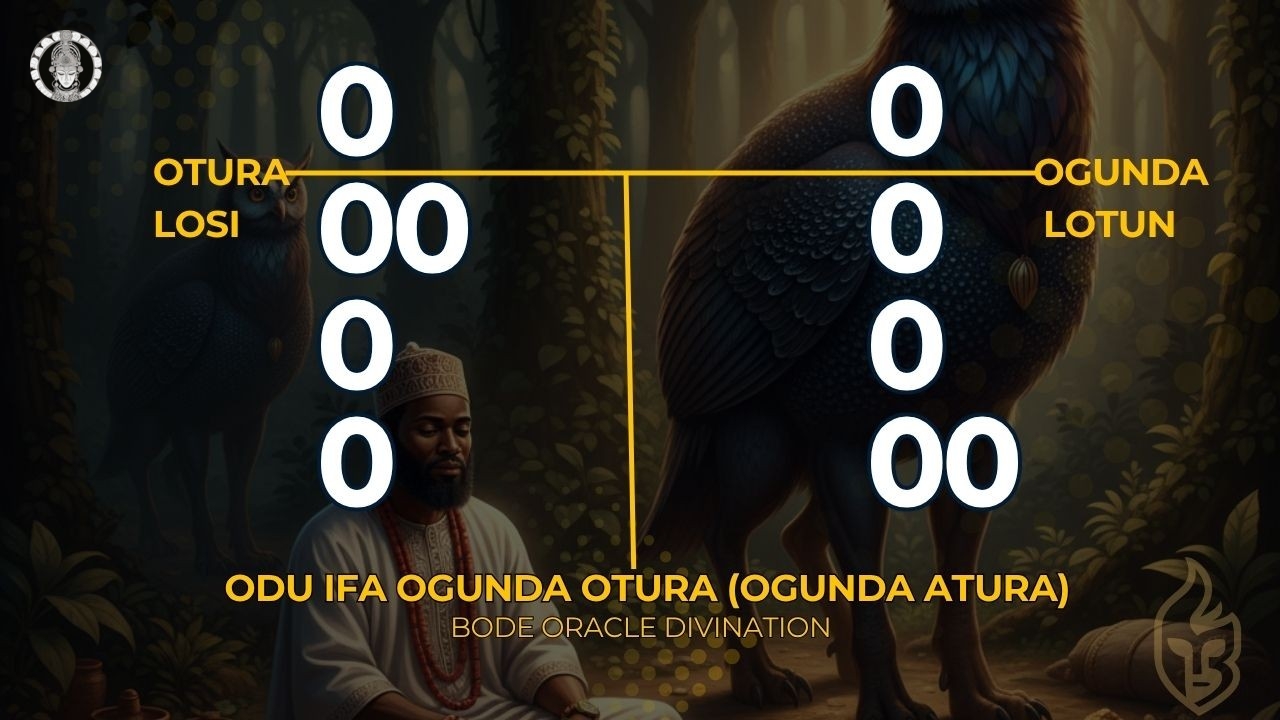
Ifa Divination for Eta: Transforming Humble Circumstances into Prosperity
The Challenge of Unpromising Beginnings
This divination from Ogunda Otura addresses a situation that many people face—having potential and a promised future while currently existing in circumstances that seem to contradict that promise. Ifa reveals that Eta, despite having a good future ordained by destiny, lacked impressive physical presence or favorable current conditions. The divination teaches that external appearances and current circumstances do not determine ultimate outcomes when spiritual intervention is properly sought and received.
The story of Eta represents everyone who has ever felt that their current situation does not match their dreams, aspirations, or sense of destiny. It demonstrates that transformation from struggle to comfort, from lack to abundance, from obscurity to recognition, is possible through compliance with Ifa's prescriptions.
The Sacred Verse
Ogun polowo odo
Gbere ga san ponanpo ni gbowo
Adifafun eta
To lojo ale ti koni taro
Ebo won ni o se
O si gbebo nibe orubo
Nje eyin ewo eta to lojo ale
Ti o ni taro
O wa di olorun a sun nan ra
English Translation
Ogun polowo odo
Gbere ga san ponanpo ni gbowo
Ifa divination was cast for the animal Eta,
Who had a good future but did not have good presence.
He was asked to offer a sacrifice,
And he complied.
Therefore, see the animal Eta,
Who had good future but did not have good presence,
Who has now become someone with comfort and dignified life.
The Contrast Between Appearance and Destiny
The phrase "to lojo ale ti koni taro" (who had a good future but did not have good presence) captures a profound tension that many people experience. Eta possessed a divinely ordained good future, yet their current circumstances and physical presence did not reflect this promise. This represents the gap between potential and manifestation, between what is promised and what is currently visible. In human terms, this speaks to people with talents that are unrecognized, with education that has not yet translated into opportunity, with dreams that seem impossibly distant from current reality.
The Transformation Through Compliance
The remarkable transformation of Eta—from someone lacking presence to "olorun a sun nan ra" (someone with comfort and dignified life)—demonstrates that Ifa's intervention can bridge the gap between unfavorable circumstances and favorable destiny. This transformation was not gradual or partial; it was complete. Eta moved from struggle to comfort, from insignificance to dignity, from lack to sufficiency. This teaches that when spiritual prescriptions are followed, transformation can be comprehensive and permanent.
Prescribed Offerings (Ebo)
For transformation of circumstances and manifestation of promised prosperity, Ifa prescribes a rooster (akuko adie), representing the announcement of one's arrival into prosperity and the awakening of dormant blessings; a hen (agbebo adie), symbolizing nurturing of opportunities and the patience required during transformation; and pigeons (eyele), representing peace and the smooth transition from lack to abundance.
Practical Application for Modern Times
In contemporary society, this Odu speaks to anyone whose current circumstances do not match their potential—unemployed graduates, struggling entrepreneurs, unrecognized talents, people whose family backgrounds or physical attributes seem to limit them. The message is clear: external circumstances and appearances are not destiny. Through proper spiritual alignment and sacrifice, transformation is not only possible but promised. Learn more about other Odu Ifa teachings like Oyeku Meji on our blog.
Ifa Divination for Orunmila: Comprehensive Protection from Enemies
Surrounded by Adversaries
This divination from Ogunda Otura addresses one of the most frightening situations a person can face—being surrounded by enemies who wish them harm. Ifa reveals that Orunmila found himself in the midst of adversaries, representing anyone who experiences opposition, hostility, or malicious intent from others. The divination demonstrates that through proper sacrifice, Ifa creates a spiritual barrier that enemies cannot penetrate, causing death, disease, and all forms of evil to turn back from the person.
The divination specifically addresses multiple threats: sudden death (iku), disease (arun), and all hereditary evils (gbogbo ajogun). This comprehensive protection speaks to the reality that enemies often attack on multiple fronts—physical health, sudden accidents, spiritual afflictions, and various misfortunes. Ifa's protection is equally comprehensive, addressing every possible avenue of attack.
The Sacred Verse
Koro koro miwa
Aja koro mi wa
Adifafun orunmila
Baba n be larin ota
Ebo won ni o se
O si gbebo nibe o rubo
Nje iku pa kuta mo o pada
Eyin koro koro miwa
Aja n koro miwa arun pakuta
O pada eyin koro koromiwa jankoro miwa
Oko pakuta opada
Eyin koromiwa ajankoromiwa
Gbogbo ajogun pakuta won pada seyin
Korokoro miwa aja n koro miwa.
English Translation
The blessings that bring relief should come to my path.
The blessings that bring comfort should come my way.
Ifa divination was cast for Orunmila,
When he was in the midst of enemies.
He was asked to offer a sacrifice,
And he complied.
Therefore, death that kills, turn back!
Don't you know that death is always sudden?
Disease that disturbs, turn back!
Don't you know that sickness is unpredictable?
Move away from me.
Sickness and death,
All of you should move away from me.
All hereditary evils must leave.
I don't want trouble. I don't like problems.
The Authority to Command Spiritual Forces
What makes this divination particularly powerful is the authoritative tone in which threats are dismissed. The verse doesn't plead with death and disease—it commands them to turn back. This demonstrates that when proper sacrifice has been performed, the person gains spiritual authority to reject evil forces. The rhetorical questions ("Don't you know that death is always sudden?" "Don't you know that sickness is unpredictable?") assert knowledge of these forces' nature while simultaneously declaring immunity from them.
The Special Offering with Stones
Ifa prescribes not just animal sacrifice but also a special preparation—a meal made with small, solid stones (okuta). This unique requirement carries deep symbolic and spiritual meaning. Stones represent permanence, durability, and immovability. By incorporating stones into the sacrificial meal, the person is symbolically establishing an immovable spiritual barrier that enemies cannot breach. The hardness of stones represents the hardness of protection; their solidity represents unwavering defense.
Prescribed Offerings (Ebo)
For protection from enemies and comprehensive spiritual defense, Ifa prescribes a rooster (akuko adie), representing spiritual alertness and the ability to see danger coming; ducks (pepeye), which are particularly effective for water-based spiritual work and represent adaptability in the face of threats; and the special meal with small solid stones (okuta), creating an impenetrable spiritual barrier. For understanding the broader cultural context of Ifa as an intangible cultural heritage, consult UNESCO's recognition.
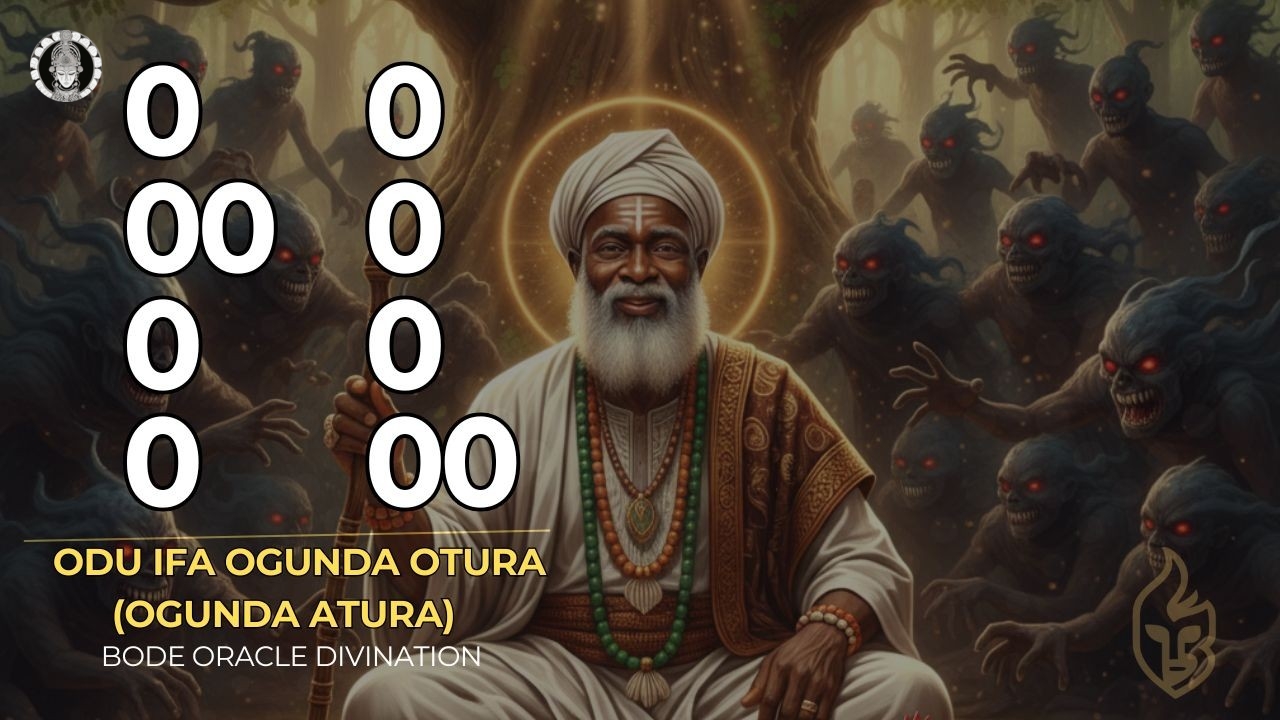
Akose and Spiritual Preparations of Ogunda Otura
Understanding Akose in Ifa Practice
Akose refers to spiritual preparations or medicinal formulations that combine herbal, animal, and mineral substances with spiritual invocations to produce specific results. Unlike ebo (sacrifices), which are offered to spiritual forces, akose are preparations that the person uses directly on their body or consumes. The akose of Ogunda Otura are particularly powerful for attracting prosperity and defeating enemies through direct spiritual empowerment.
Akose Awure Ola: Spiritual Bath for Wealth and Blessings
This akose is specifically designed to attract continuous prosperity, financial success, and general blessings (ola) into one's life. The preparation involves combining several spiritually potent herbs with animal elements to create a bath that aligns one's spiritual frequency with abundance.
Ingredients and Preparation
The akose requires akisan leaves (ewe akisan), known for their attracting properties; ire leaves (ewe ire), which literally means "good fortune" leaves; aje leaves (ewe aje), directly associated with wealth and prosperity; oju oro leaves (ewe oju oro), representing insight and foresight in financial matters; osibata leaves (ewe osibata), for grounding and manifestation; the intestines of a hen (inu agbebo adie), representing the absorption and processing of blessings; and black soap (ose dudu), for spiritual cleansing and purification.
Spiritual Significance of the Ingredients
Each component carries specific spiritual properties that work synergistically. The combination of five different leaves represents comprehensive attraction of blessings from multiple sources. The intestines of the hen symbolize the body's ability to absorb and process prosperity. Black soap provides the cleansing foundation necessary for new blessings to adhere. The white-covered calabash (igba olomori funfun) in which the mixture is stored represents purity and the sacred nature of the preparation.
Proper Application
The preparation is used for bathing every morning (laro laro), establishing a daily spiritual practice that continuously attracts and reinforces prosperity. Morning application is strategic—it prepares the person for the day ahead, ensuring that every encounter and opportunity is spiritually charged for success. The consistency of daily use creates cumulative spiritual momentum that compounds over time.
Akose Isegun Ota: Preparation for Victory Over Enemies
This akose is specifically designed to empower the person with spiritual authority that defeats opposition and ensures victory in conflicts or competitive situations.
Ingredients and Preparation
The akose requires imi orun (a specific spiritual substance whose exact nature is known to initiated practitioners), gunpowder (ibon igidi), representing explosive spiritual power and the ability to scatter opposition, and guinea fowl feather (etu), symbolizing alertness, territorial protection, and the aggressive defense of one's space. These ingredients are ground together into a fine powder and used to make three incisions (singbere meta) in the middle of the head (arin ori).
The Strategic Placement
The head represents consciousness, authority, and personal power in Yoruba spirituality. The middle of the head (arin ori) is particularly significant as it represents the center of one's personal authority and the seat of one's destiny (ori). Making three incisions invokes spiritual completeness and divine perfection. By placing this powerful preparation at the center of the head, every thought, decision, and action the person takes carries spiritual authority that defeats enemies.
The Power of Gunpowder
The inclusion of gunpowder is particularly significant. Gunpowder represents sudden, explosive, overwhelming force. It symbolizes the ability to scatter enemies quickly and decisively, preventing them from organizing effective opposition. The spiritual principle is that just as gunpowder scatters physical objects, this preparation scatters spiritual opposition.
Important Considerations for Akose Use
Both akose preparations should only be prepared and applied under the guidance of a qualified Babalawo who can properly invoke the necessary incantations (ofo ase) and ensure correct preparation according to traditional protocols. The spiritual power of akose comes not just from the physical ingredients but from the prayers, invocations, and spiritual knowledge that accompany their preparation and use. Improper preparation or use without proper spiritual activation renders akose ineffective or potentially harmful. For scholarly analysis of Ifa divination systems and practices, explore comprehensive documentation.
Additional Resources
Internal Links
- Complete Guide to Ogunda Otura - Detailed information, taboos, and practices
- Oyeku Meji - Another powerful Odu Ifa teaching
- Bode.ng Blog - Extensive collection of Ifa and Yoruba spirituality articles
- Complete Odu Ifa Directory
- Bode Oracle - Home of Ifa wisdom and divination services
External Resources
- African Traditional Religions: Ifa Divination - Duquesne University
- Ifa of the Yoruba People of Nigeria - UNESCO
- Algebraic Characterization of Ifa Main Divination Codes
- UNESCO Recognition of Ifa Divination System
- Ifa Divination System - Wikipedia
- Opon Ifa (Divination Tray) - Wikipedia
Connect With Us on Social Media
- BODE Oracle on TikTok
- BODE Oracle on YouTube
- BODE Oracle on Facebook
- BODE Oracle on X (Twitter)
- BODE Oracle on Pinterest
Visit Bode.ng to explore more divination teachings, participate in quizzes and polls, and connect with our community of practitioners and learners. Register today to access exclusive content and personalized guidance on your spiritual journey.
Frequently Asked Questions And Answers About Odu Ifa Ogunda Otura (Ogunda Atura)
Find answers to common questions about this sacred Odu Ifa and its divination teachings
Ogunda Otura, also called Ogunda Atura, is one of the 256 sacred Odu (divination signs) in the Ifa corpus. It carries powerful messages about leadership and recognition, the blessing of children and multiple births, prosperity despite humble appearances, and victory over enemies. This Odu teaches that through proper sacrifice and spiritual obedience, one can achieve positions of authority, receive fertility blessings, and overcome adversaries who seek to harm them.
Ogunda Otura promises that through proper sacrifice, a person competing with others for a position of authority will emerge victorious. The divination of the Farm Tree specifically addresses this, revealing that when offered the prescribed ebo (rooster, hen, pigeons, and money), one will be chosen as the leader even among many competitors. The Odu emphasizes that divine selection supersedes human competition when spiritual obligations are fulfilled.
The divination for Orunmila in Ogunda Otura demonstrates powerful fertility blessings. When various creatures ask why they struggle with childbirth, Orunmila reveals that proper sacrifice brings extraordinary fertility—the ability to give birth in a single day, to have twins, and even triplets. However, the story emphasizes that only the human who actually performed the sacrifice received these blessings, teaching that spiritual knowledge without action produces no results.
The divination of Eta teaches that external appearances do not determine destiny. Eta, though lacking impressive physical presence, was promised a good future through Ifa. After performing the prescribed sacrifice, Eta transformed from struggle and hardship into a life of comfort and dignity. This story demonstrates that Ifa's blessings can elevate anyone regardless of their current circumstances or physical attributes when they comply with spiritual prescriptions.
The final divination for Orunmila in Ogunda Otura addresses protection when surrounded by enemies. Through proper sacrifice of rooster and duck, along with a special meal prepared with small solid stones, Ifa provides comprehensive protection. The verse declares that death that kills suddenly must turn back, disease must depart, and all hereditary evils (ajogun) must flee. This demonstrates Ifa's power to create a spiritual barrier that enemies cannot penetrate.
Akose Awure Ola is a spiritual bath preparation designed to attract wealth, blessings, and prosperity. It combines akisan leaves, ire leaves, aje leaves, oju oro leaves, and osibata leaves with the intestines of a hen, ground together with black soap and placed in a white-covered calabash. The person bathes with this preparation every morning to attract continuous blessings and financial prosperity into their life.
Akose Isegun Ota is a spiritual preparation for victory over enemies. It combines imi orun (a specific spiritual substance), gunpowder, and guinea fowl feather, ground together and used to make three incisions in the middle of the head. This placement is strategic—the head represents authority and consciousness, and marking it with this powerful preparation ensures that one's thoughts, decisions, and presence carry spiritual authority that defeats opposition.
The story teaches a fundamental principle: knowledge without action produces no results. The rat, fish, bird, goat, and human all received the same divination and prescription for childbirth blessings. However, only the human actually performed the sacrifice. As a result, only the human received the promised blessings of multiple children, twins, and triplets, while the others experienced great sorrow. This demonstrates that spiritual opportunity is democratic but spiritual blessing is earned through obedience.
Ogunda Otura emphasizes the critical importance of following spiritual instructions without hesitation. The Odu specifically warns against disobedience or neglecting prescribed sacrifices, as this leads to loss of blessings and opportunities. It teaches that when competing with others, spiritual preparation determines the outcome. It also emphasizes patience and persistence—like Eta, whose humble circumstances transformed into prosperity through faith and compliance with Ifa's guidance.
All sacrifices (ebo) and spiritual preparations (akose) in Ogunda Otura should be performed under the guidance of a qualified Babalawo (Ifa priest). The priest ensures proper procedures, invokes necessary incantations, and adapts traditional practices to modern contexts when needed. Different divinations within Ogunda Otura require different offerings: leadership aspirations require rooster, hen, and pigeons; childbirth blessings require hen, pigeon, and rooster; prosperity requires rooster, hen, and pigeon; protection from enemies requires rooster and duck.
The Farm Tree divination teaches that when many are called but few are chosen, spiritual preparation determines who receives the position. The farm tree competed with all other trees for leadership and was selected through proper sacrifice. This demonstrates that in any competitive situation—whether for jobs, titles, recognition, or opportunities—those who combine effort with spiritual obedience position themselves for divine favor that supersedes human judgment.
You can explore comprehensive information about Ogunda Otura and Ifa divination through several resources:
- Complete Guide to Ogunda Otura - Detailed taboos and practices
- Oyeku Meji teachings
- Bode.ng Blog - Extensive articles on Ifa spirituality
- Complete Odu Ifa Directory
- Bode.ng - Access divination services and community resources
Connect with us on social media for regular teachings: TikTok, YouTube, Facebook, X (Twitter), and Pinterest @BODEOracle.
